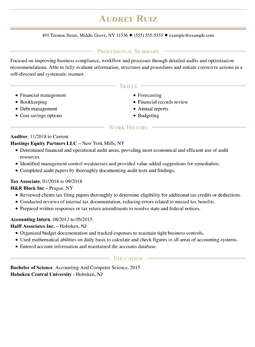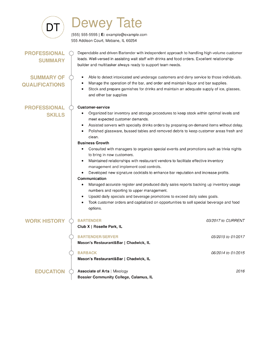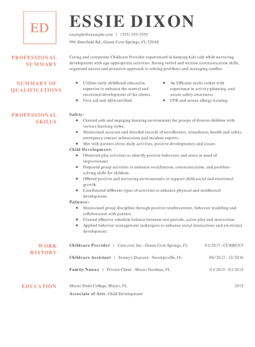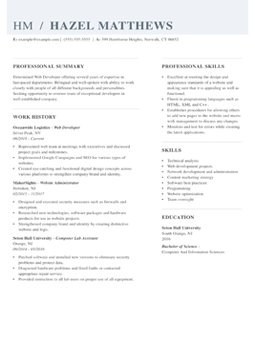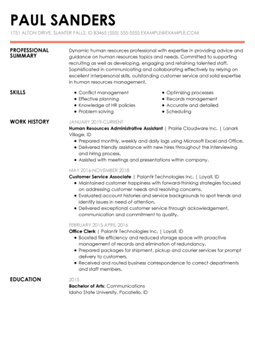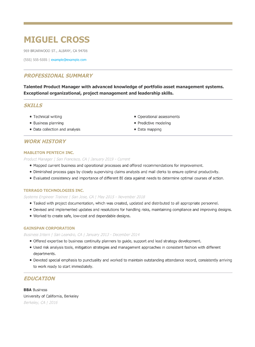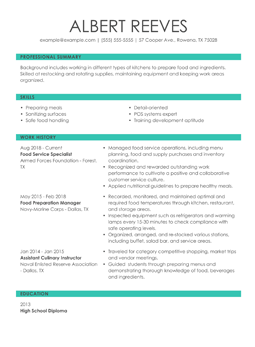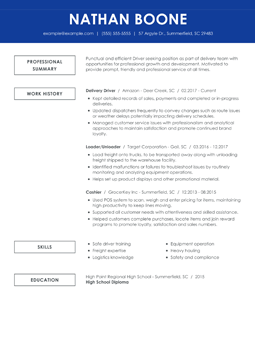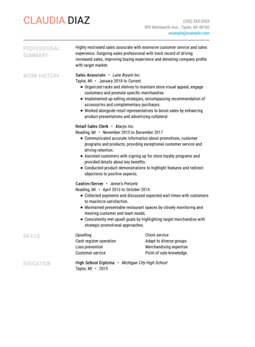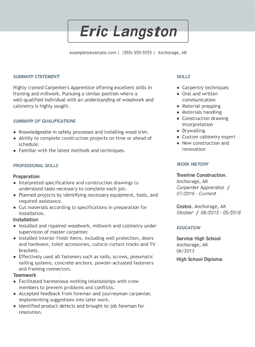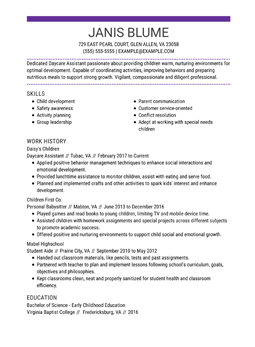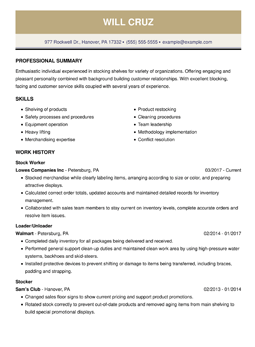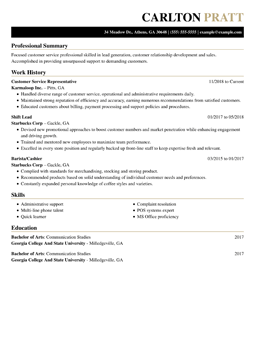Free Downloadable Social Services Resume Templates and Expert Writing Tips

- Featured In:

Table of Contents
- Best Free Downloadable Resume Templates for Social Services Jobs
- 9 Social Services Resume Examples
- What Can You Earn as a Social Services Professional?
- Top Social Services Skills for Your Resume
- Best 5 Certifications for Your Social Services Resume
- Improve Your Writing Speed with a Resume Builder
- Social Services FAQ
Here are more resources that can help you
-
Resume/CV Templates
-
- Basic Resume Template
- Creative Resume Template
- Portfolio Resume Template
- Modern Resume Template
- ATS Resume Template
- One-Page Resume Template
- Google Docs Resume Template
- CV Template
- Biodata Resume Template
- Writer Resume Example
- High School Student Resume Example
- Internship Resume Example
- Entry Level Resume Example
- Massage Therapist Resume Example
- Medical Assistant Resume Example
- Cashier Resume Example
- BabySitter Resume Example
- Customer Service Example
- Attorney Resume Example
- Customer Service Representative Resume Example
- Teacher Resume Example
- Engineering Resume Example
- Nurse Resume Example
- Latex Resume Template
- College Student Resume Example
- High School Graduate Resume Example
-
Resume Help
Counselors, volunteers, behavior technicians and social workers make up the social services industry. To thrive as a social services professional, you need a resume that shows you’re prepared to tackle anything. We’ll help you showcase your communication, case management and crisis intervention skills with the help of resume examples, free resume templates and top social services skills for various job titles within the field.
Best Free Downloadable Resume Templates for Social Services Jobs
-
Rosy Outlook
The resume template above is stylized to make you stand out from the rest of the competition. You can customize this template on your favorite word processor to highlight the appropriate accomplishments and skills required for a job in social services. -
Creative Conventions
Multiple sections highlighting the candidate's certifications, licenses and awards make this resume template ideal for a highly accomplished social services professional. Download this template to edit it on your preferred word processor, and customize it with your professional information. -
Cosmopolitan
This standard chronological resume template offers a clean and straightforward design apt for anyone in the social services field. You can download this template and expand your work history section to add more entries according to your years of experience. -
Solid Segments
This two-column resume template is able to pack a lot of information, a great option for social services professionals with a large skill set and ample experience. Use the writing tips in this template as a guideline while filling in your details to craft the ideal resume. -
Creative Formal
This elegant resume includes a sidebar where you can include concise information such as your summary statement, list of skills and education section. The rest of the page has enough space to mention an extensive work history with key qualifications such as emotional maturity when handling underage individuals' cases and providing tailored counseling paired with actionable strategies and planning. -
Career Pitch
Showcase your career achievements and social services skills on this visually-attractive resume template. Expand your education section to include awards and other credentials to increase your credibility as a professional in the field.
9 Social Services Resume Examples
Every resume falls under one of the three resume styles or formats, which are chronological, combination and functional. These formats organize your resume in a way that highlights your strengths and masks your weaknesses.
Check out our social services resume examples for each format below and choose the one that suits you the most:
Chronological Resume
The most common resume is the chronological format, which highlights the candidate’s professional experience by describing a detailed work history in reverse chronological order.
Candidates with years of professional experience under their belt applying for senior positions like case manager, counselor or advanced applied behavior analyst would benefit from this format.
-
1. Case Manager: Individuals that ensure proper care for the client’s mental, physical and emotional well-being. They are responsible for creating the most efficient and cost-effective treatment plans. The detailed work history takes center stage and shows you have the experience to deal with any case.
-
2. Counselor: It is essential for candidates seeking this job to listen to their patients carefully, analyze their dilemmas and identify the underlying problems. Having the work history in reverse chronological order makes it easier for the recruiter to assess the candidate’s career growth.
-
3. Juvenile Court Liaison: Essential professionals throughout the social services field, these individuals make sure the court processes occur legally and orderly for children and underage young adults. This resume reflects the applicant's expertise as a liaison by showcasing her experiences in the various departments dealing with youth.
Combination Resume
Candidates who want to display their social skills and prowess in detail should opt for the combination resume. This resume format gives equal attention to the individual’s skills and work history. As a social services professional, you can highlight the critical skills you’ve acquired, like communication and behavior treatment combined with solid experience working in the courts, private institutions or nonprofit organizations.
Job seekers who have less than 10 years of experience, who are changing careers, looking to gain a promotion or returning to the workforce after a break can all use this resume to their benefit. Below are a few social service roles for which a combination resume would be ideal:
-
1. Behavior Technician: These technicians work one-on-one with patients to understand and help them improve their conditions. This role requires candidates to have empathy and excellent communication skills, both of which are successfully expressed in Harley Evan’s resume with the help of quantifiable work achievements.
-
2. School Social Worker: School social workers help create educational plans to decrease students’ academic pressure and help them thrive in all areas of their education. In a combination resume, you can place the skills section above the work history section so recruiters get an idea of your skill set and how they helped you fulfill the achievements on your work history.
-
3. Social Work Assistant: Social work can involve multiple responsibilities, from assisting the elderly in daily tasks to working with war veterans suffering from PTSD. An assistant in this field should have varied experiences, just like Gabe Cooper has in his resume. Paired with the right skill set, you'll be able to get hired in this position and move on up as you gain more experience.
Functional Resume
Entry-level candidates with little to no job experience use functional resumes to highlight their skills while downplaying their limited work history. Unlike the previous two formats, the work history is sidelined, and instead, the skill section is the main event, giving employers a better understanding of the individual’s top three job-relevant skills.
This format is not as common as the others and recruiters often value work experience over acquired skills. However, using this resume format in less formal work settings like a small organization or an internship position will do the trick if you want to get your foot in the door.
If you have the interpersonal, communication and collaborative skills to work in the social services field, you should use the functional format for job openings like the following:
-
1. Child Welfare Specialist: This role requires knowledge of patient care along with the administrative and organization skills to take care of the various arrangements in the adoption or fostering process. The expansion of administrative assistance and social support work skills in this resume makes up for the candidate’s lack of experience.
-
2. Medical Social Worker: These individuals help patients and their families understand their ailments better to prepare them emotionally and financially. A summary of qualifications and a detailed bulleted skill section replace the elaborate work history entries in the resume above.
-
3. Social Science Research Assistant: These research assistants analyze interpersonal human interaction from a mass of data acquired on evaluations and reports. The functional format is suitable for candidates that want to highlight their data management and research skills for this job despite a lack of experience in the field or in this particular role.
What Can You Earn as a Social Services Professional?
Social services professionals work in methyl health clinics, schools, hospitals, private practices or government agencies. Wages differ across various jobs and states, but according to the Bureau of Labor Statistics, a social worker on average earns the following in different industries:
Top Social Services Skills for Your Resume
Skills are a vital part of your resume, regardless of the format. You can include soft, hard and technical skills throughout your resume in the following sections:
- Professional Summary: This concise opening statement should have one or two of your critical skills. For example, a social worker could write, “adept at providing patient care with a specialization in elder care services.”
- Skills Section: A typical resume skills section consists of six to eight keywords. A social worker can mention their critical thinking, adaptability, patient record-keeping and Microsoft Office skills. Make sure to not repeat these skills in any other area of your resume.
- Work History: Chronological and combination formats must include skills in their work history entries. Every entry must have at least one skill as a task or achievement accomplished by the candidate. For example, a behavior technician could mention they're skilled at creating treatment plans by writing: "Created over 40 treatment plans for patients diagnosed with behavior disorders."
We've collected the top-recommended skills required for social services professionals from online job descriptions and postings. Incorporate them in your resume if it fits your description.
Soft skills
Soft skills are the social abilities required to interact with other employees, patients and clients. These skills also enable you to be a better worker overall. A few soft skills necessary to function as a social service professional are as follows:
- 1. Excellent written and verbal communication
- 2. Empathy
- 3. Listening skills
- 4. Problem-solving
- 5. Multitasking
- 6. Patience
- 7. Critical thinking
- 8. Adaptability
- 9. Flexibility
- 10. Being prompt and anticipating needs
Hard skills
Hard skills are the knowledge of the several tasks required to perform at your job. They vary from role to role, but essential hard skills for a social services professional are:
- 1. Record-keeping
- 2. Arranging appropriate care and allocating resources
- 3. Preparation of treatment plans
- 4. Therapy and counseling
- 5. Legal advice
- 6. Providing mental health resources
- 7. Treatment plan implementation
- 8. Basic knowledge of first aid
- 9. Cardiopulmonary resuscitation (CPR)
- 10. Patient/client documentation
Technical skills
Technical skills define your adeptness with applications and online tools that increase your work productivity and efficiency. Essential technical skills needed as social services professionals are:
- 1. Basic computer operation
- 2. Telehealth and patient engagement platforms, i.e., Mend and Kareo Clinical
- 3. Microsoft Office
- 4. Proficient in usage of social media
- 5. Database management
- 6. Applied behavior analysis (ABA) software
Best 5 Certifications for Your Social Services Resume
A social service worker is sufficiently qualified with a degree in sociology, psychology or a related field of study. Still, you can expand your knowledge according to your interests with the help of the following certifications:
- Registered Behavior Technician Certification (RBT)
- Autism Certificate
- CPR Certification
- Certified Social Work Case Manager (C-SWCM)
- Certified School Social Work Specialist (C-SSWS)
Improve Your Writing Speed with a Resume Builder
Use our Resume Builder to get immediate access to a horde of customizable resume templates. Select from our carousel of job profiles and get content catered for each role at the tip of your fingers. After you’ve made the changes in your resume draft, store it online, and start working on another resume. With our unlimited storage system, you won’t have to worry about running out of space.
This simple layout features a traditional font and the clever use of section borders to help each section of your resume stand out.
This distinctive two-column resume template identifies your name and professional experience in a bold color and clean presentation.
A clever design that breaks each of your professional accomplishments into distinct sections while following a format that will pass applicant tracking systems.
The elegant initials, simple header and strategic use of bullet points in this template help keep your professional accomplishments well-organized.
The bold use of a colorblocked heading paired with an elegant resume layout helps your name and contact information stand out.
This structured design combines a two-column approach with bullet points to highlight your key accomplishments and professional history.
A traditional template uses a crisp combination of dark text and thin borders to radiate professionalism. Your name sits prominently above your professional history.
This template’s design features plenty of whitespace neatly divided by gray bars to make the information on your resume easy to read for employers.
This two-column resume conveys a very clear breakdown of its sections that allows a hiring manager to quickly scan your resume.
The subtle color accents in this template add visual pizzazz in a classy way, a great option for most traditional industries.
This resume’s modern design and bold use of color make it pop. Its uniqueness is well-suited to those seeking jobs in creative industries.
Everything about this template is assertive from the boxy layout to its all-caps heading text that gives the impression that you’re all about business.
The understated contact information at the top puts attention front and center on your professional summary, skills, work experience and education sections.
The subtle use of red alongside black gives this template a bold feel while still featuring plenty of white space to make it easy to read.
Customer Reviews
FAQ
What are the top 3 skills of a social services assistant?
The top three skills required as a social services assistant depend on the work you're undertaking. In general, the three essential skills a professional in this field must possess are as follows:
- Communication skills
- Empathy
- Critical thinking
What do social services assistants mention under a summary statement?
The professional summary is supposed to be a concise and informative paragraph describing your best abilities for the job. A standard summary statement must include the following:
- Skills and qualifications that show how you're going to fulfill the role's requirements.
- Quantifiable accomplishments from previous workplaces.
- A task requiring job-relevant skills to accomplish.
What are examples of social services duties?
The duties a social services worker takes on vary with the role and sector to which you're assigned. An orphan seeking a foster home has different needs than a sick, elderly patient. But some overlapping duties among social service professionals are as follows:
- Patient record-keeping
- Arranging appropriate care and resources
- Preparation of treatment plans
- Providing therapy and counseling
- Providing mental health resources
- Basic knowledge of first aid
Rate our Templates















